
Guests
- Wole SoyinkaNigerian playwright, author and poet.
Watch Part 2 of our interview with Wole Soyinka, the acclaimed Nigerian writer who was the first African to receive the Nobel Prize for Literature in 1986. We contacted him to respond to President Trump’s threat this weekend to strike Africa’s most populous country, the largest oil producer in Africa. In a post on Truth Social Saturday, Trump said, “The U.S.A. will immediately stop all aid and assistance to Nigeria, and may well go into that now disgraced country, ‘guns-a-blazing’ … If we attack, it will be fast, vicious, and sweet, just like the terrorist thugs attack our CHERISHED Christians!”
“I’m a teacher of language, a user professionally of language. And I tell you, I was stopped short when I read that quote, but not surprised,” responds Soyinka, aged 91, who is an arts professor of theater at NYU Abu Dhabi. “I’ve heard that kind of language before. I’ve heard it from Idi Amin. If you check the documents, documentaries on Idi Amin, you’ll find that he uses just that kind of combination of appalling language of intent frequently. In fact, it was second nature to him. And he used to fulfill those threats.”
Soyinka also discusses surviving U.S.-backed Nigerian military regimes and shares advice for people in the United States who are concerned about authoritarianism, saying, “They should not take for granted the fact that they have a history of democratic existence, with all its flaws.”
Transcript
AMY GOODMAN: This is Democracy Now!, democracynow.org, The War and Peace Report. I’m Amy Goodman.
We continue now with Part 2 of our interview with Wole Soyinka, the acclaimed Nigerian playwright, author and poet. He was the first African to receive the Nobel Prize for Literature in 1986. He is arts professor of theater at NYU Abu Dhabi.
We contacted him to respond to President Trump’s threat this weekend to strike Africa’s most populous country, the largest oil producer in Africa. In a post on Truth Social Saturday, Trump wrote in part, quote, “The U.S.A. will immediately stop all aid and assistance to Nigeria, and may well go into that now disgraced country, 'guns-a-blazing' … If we attack, it will be fast, vicious, and sweet, just like the terrorist thugs attack our CHERISHED Christians!” Trump wrote.
Thank you so much, Professor Wole Soyinka, for staying with us, from Lagos, Nigeria. Before we talk more about the U.S. stopping you from coming to the United States, acclaimed, world-acclaimed writer and poet, if you could respond again to that quote that we started with in Part 1 of our discussion, saying that the U.S. might attack Nigeria, “guns-a-blazing,” and the attack would be “vicious” and “sweet”?
WOLE SOYINKA: You see, I’m a teacher of language, a user professionally of language. And I tell you, I was stopped short when I read that quote, but not surprised. I’ve heard that kind of language before. I’ve heard it from Idi Amin. If you check the documents, documentaries on Idi Amin, you’ll find that he uses just that kind of combination of appalling language of intent frequently. In fact, it was second nature to him. And he used to fulfill those threats.
I recall one interview when he had decided to do what Trump has been doing lately, which is to find scapegoats and throw out those who can be held responsible for the economic problems of the United States. I remember once it was asked, “If the Asians whom you’ve given,” I think it was, “80 days or 60 days to leave Uganda — if they refuse to leave, what are you going to do?” He said, “Ha, you will see that they are sitting on a fire, I promise you.” I remember that quote, not exact, but that’s it. And it was like you just superimpose the image of Donald Trump over Idi Amin, and, believe me, there is absolutely no difference.
I’m not even going to go into issues of his, Donald Trump’s interview, where he said he likes war. He said he enjoys war. And it’s clear he’s dying to make war. He says he wants to help Nigeria. Of course, anybody, any leader, any nation, would gladly accept assistance from anywhere to get rid of this vicious fundamentalist group whose principle, whose understanding of their religion is just to butcher others who happen not to follow them. So, they are there as the enemy. At the same time, there has been partnership, partnership between Nigeria, other regimes for weaponry, equipment, training to deal with these well-organized and transnational killers under the name of Islam. They exist.
And what Trump should do is just come down from his high horse and negotiate with those who have a similar problem, and then let them, let their own personnel handle that problem. It’s an internal, but at the same time, of course, international, but they’re responsible for their own borders. Some fail. Others just find that the failure has resulted in a mere intractable issue. If Donald Trump is serious, he can put on a Nigerian uniform and join the Nigerian Army, as an adviser maybe, because he’s never really seen war, has he? But his advice, you know, and I think Nigerians would appreciate that, but to use language like invading the sovereignty of a nation, guns blazing, sweetly, viciously —
AMY GOODMAN: It’s interesting you should have compared Trump to Idi Amin — you called him a white Idi Amin — because Idi Amin, in addition to being brutal and killing so many Ugandans, was responsible for the expulsion of Indian Ugandans, and when you look at the parallel in the United States of ICE’s crackdown on immigrants in this country.
WOLE SOYINKA: Well, you know that even though I’m in Abu Dhabi, I’ve been teaching, at least for now — I don’t know how long that’ll last. His long reach extends even beyond the U.S. borders. But right now as a member of faculty, I get reports. I’ve seen reports. I’ve seen videos of the activities of Trump, Donald Trump’s ICE, very — his activity, in this respect, even reminds me of yet another dictatorial phenomenon, Papa Doc Duvalier of Haiti, who used to send his zombies, the equivalent of ICE, in the streets, into people’s homes. He used to believe very much in supernatural powers, but he used the standard means of eradication of supposed critics, the scapegoated individuals, institutions.
He’s been after institutions. It’s obvious this man hates learning institutions. It’s not just me saying. Members of my Nobel caucus have written. I remember reading a very thoughtful and pained article by a winner of the Nobel Prize in Chemistry, who used to be in an authoritarian nation, where what’s going on in the United States was what took him out of his former Eastern European country. I mean, that’s a sad — that’s a sad comedown for the United States of America.
But we don’t, on that account, say that the U.S.A. is a disgraced country. No, we distinguish between an international phenomenon and the means, the access to empowerment of those enemies of humanity, wherever they are. And we don’t just condemn the country absolutely because of that, of that passage, of that trial of their integrity, of their humanity. No, we just know that this problem exists, and there should be collaboration in eliminating that issue.
AMY GOODMAN: If you could give us more context, for people who don’t understand what’s happening in Nigeria? I mean, it’s very interesting that Trump should say we’re going to go in, guns blazing, shocking many this weekend, as he also desperately seeks the Nobel Peace Prize, a Nobel Prize, something that you did receive, not the Nobel Peace Prize, but the Nobel Prize for Literature. But I’m wondering if you can give us even more context to what’s happening in Nigeria. Reading from Al Jazeera, “Nigeria, a country of more than 200 million people, is divided between the largely Muslim north and mostly Christian south. Armed groups have been engaged in a conflict that has been largely confined to the northeast of the country, which is majority Muslim, and has dragged on for more than 15 years.” But so interesting that with groups like Boko Haram killing so many, but so many of them, because it’s in northern Nigeria, are actually Muslim.
WOLE SOYINKA: No, and I think there is also — there’s also — many people think it’s insignificant, but there’s also a third, shall we say a third, religious grouping, which is what we call traditional religions. They exist, and they intersect. You’ll find Muslims who actually also secretly go the traditional way. You have Christians who go to church on Sundays and on traditional days also go and worship their gods and their system of accessing and identifying with universal spirituality. Those also exist. But you’re right historically, and this is from historical factors. You’ll have far greater Muslims in the north, and in the south you have far more numerous Christians. That is true.
But it doesn’t mean that other factors, like even ethnicity, access to food — for instance, the clash between the farmers and the herders, I think something which the United States also went through in its coming in being as a nation. And you have those, and they can be very — they prove to be very, very vicious. But because the herding community, the herding the cow, cattle culture, is more prominent in the north, it gets conflated, even among the followers, with one religion. In other words, when people see a cattle herder, automatically it’s assumed that this must be a Muslim. On very often broad lines, this is not totally inaccurate.
But where you find the physical conflict, it becomes a little bit more confused. The Middle Belt region, for instance, given where we have the Tivs, this largely is also a Christian belt, largely. But when the Fulani identified with the — with husband, animal husbandry, when they then even began to penetrate, kidnap, rape and kill in the south, then we’re confronted with a truly national issue, not just a sectional one. And it should be addressed in that way, as a mixture of many factors, not simplistically to say, “OK, we have Muslim, Christian, and these ones live here, and these ones are there.” The Muslims also have suffered at the hands of Boko Haram and Islam. I mean, at a certain stage, in certain areas, Muslims were forbidden even to wash in — were forbidden to obtain or to pursue children, not allowed to go to Western schools. In other words, there’s also the sense of Western civilization and Arabized kind of culture. It’s a potpourri.
For me, it’s an issue of: Are there laws or no? Is there a constitution? Is there criminality in kidnapping, in rape, especially school children being kidnapped and taken into the bush and then shared among these bandits? We call them “bandits,” just taking the name of religion. And then, whoever they are, there’s got to be an enforcement of the law, provision of security. This is where a number of leaders have failed in Nigeria.
AMY GOODMAN: And if you can talk about the role of the United States in Nigeria? I mean, interestingly, you yourself were imprisoned for several years in the 1960s. And then in — what was it? — ’77 to ’79, you were charged with treason in absentia by the general, Sani Abacha, the dictator at the time. But the role the U.S. has played in supporting Nigerian dictatorships and where it stands today in the so-called war on terror, providing funds to the Nigerian government?
WOLE SOYINKA: This is what is so galling for me personally, and for those of my own religious persuasion internally, what we’ve undergone at the hands of brutal leadership, which led to some of us taking refuge elsewhere. Where did I take refuge? In the United States. I had a choice, actually, between France and a couple of other places, but for a number of reasons — convenience, association, language — I came to the United States. And I was received and protected there.
I recall a few times when I received a message from the U.S. — maybe internal department, I don’t know — asking me to watch my steps, that it was Sani Abacha at the time, that he was setting up posts to deal — like, possible eliminate — with political opponents. That was the time when I was declared wanted dead or alive. And my vice chancellor, the provost, I think you call it over there, William Chace, I remember, immediately assigned me police protection to go anywhere. In fact, I spent my time dodging the police, because I found it embarrassing being protected in that manner. But that’s another story. But the important thing is that we found refuge in the States. And some of those refugees are still in the States.
Now, in fact, it was Jimmy Carter who assisted. In fact, he intervened. He left office. When he found I was having difficulties obtaining a green card, he stepped in. And within three days, in time for me to be able to join others for a crucial meeting of the opposition in Britain, because if I had left, I couldn’t have come in — I had left without my green card — he stepped in. Within three days, my green card was delivered to me.
Now, how can I not be worried and concerned when a new leader comes, whose understanding of democracy is that when — let us cite the example of Floyd George — when he’s lynched by an officer of the law in plain sight, the only comment he could say, he could utter, was, “Go out in the streets and dominate that space.” So, the beginning of Donald Trump ideology was already transparent from his first coming, even before he took office. His campaign laid a trail of extrajudicial killing on an unprecedented scale in the United States, which is one of the reasons I just said, “I have had enough,” and I cut up my green card and left and said, “I’m not coming back to the States.” However, after a while, owing to an invitation by the Internal Revenue Service, I went to the embassy and said, “Listen, I’ve cut up my green card, and the IRS wants to turn me into a tax dodger. I must go back and answer the audit,” which I did.
So, the United States, as a people, as institutions, has been very kind to me, and I appreciate that a lot. And this is one reason why the contrast, when it surfaces, I consider it part of my payback to point it out to the rest of the world, even to Americans themselves, who underestimate this malevolent phenomenon, to remind them of what they are, and say, “You have an Idi Amin in white face in the White House, and you’d better sit up and take notice.” That’s all.
AMY GOODMAN: So, do you think that has something to do with you having your visa denied or revoked now? Can you talk about what happened? You were going to get it renewed just this year.
WOLE SOYINKA: What happened is very simple. I got a notice from the embassy in Lagos asking me to report to have my visa reviewed, the B-1/B-2, which was given me, you know, to be able to go and answer the internal audit. And I was supposed to go back, and a date was given for this review. Well, immediately I sensed what that meant. I have a history, after all. I’ve got up my green card before. I’ve spoken about the season of misrule under this particular leadership. I attended a conference in Chicago organized by the Nobel Foundation and the University of Chicago, in which, as usual, I spoke my mind. I think we even — the meeting was supposed to be an effort to prevent the world blowing itself up under the atomic imperative. And I remember distributing even cartoons of the leaders whom I considered geared towards this self-immolation. And I recall somebody saying, “Oh, be careful. Trump might go after you.” So, I have a history. Let’s put it that way. If I joke about it, that’s different, but I do have a history.
So, when I was invited to come for my review, I didn’t fool myself. I said, “I’m not coming. If you want to take my visa, revoke it. Go ahead.” I had a nice, very courteous conversation with the ambassador. He was — he called me, tried to persuade me to go to attend that interview. And I said no. At the end, he said, “You know, you realize, of course, that means that your visa will be revoked.” And I said, “Do your duty. I’m here. I have nothing against your staff. A number of you have been in my house before. You’re free to continue to visit, if you like, and I won’t even ask you for a visa.” So, it was — for me, it’s an amicable separation. There’s just going about the rest of my geographical constituency outside the United States.
AMY GOODMAN: Can you respond to President Trump bringing down the number of refugees who can come into this country from 125,000 to something like 7,500, many of those 7,500 white South Africans? Here, Wole Soyinka, you lived in this country for years, taught at some of the most erudite and respected institutions here, but you have your visa denied.
WOLE SOYINKA: Well, you know, I think it’s probably — there are certainly worse things than having your visa denied. Look at the treatment of Cyril Ramaphosa, the president of South Africa, when he visited Donald Trump. I think Ramaphosa must be one of the most urbane and civilized world leaders I’ve ever encountered, because if I were he and Donald Trump laid an ambush for me like that, and with a — with false, fake material, throwing out my own people while embracing whites, who were not even under persecution in South Africa — it turned out that the video which he played, Donald Trump played to Ramaphosa to accuse him of genocide, was a fake one. It was not even South Africa. It was, I think — I forgot now. I think it was Mozambique or somewhere. And it wasn’t that they were being mistreated, they’ve been killed or arrested and detained. No, it was just a trap, yeah, a nasty, really unprincipled ambush. Ramaphosa, an African leader. I consider myself getting off lightly just having my visa revoked.
AMY GOODMAN: Well —
WOLE SOYINKA: And that’s the [inaudible] — sorry — of Third World people being picked off the street, is, you see, this is not about Wole Soyinka. I hope you understand that. It’s about the treatment being given to my own people, you know, others, you know, who are supposed to be powerless nations, being taken off the street, disappeared, taken to holding pens, without families being informed. I mean, we’re entering a phase of fascism which I never thought could sprout its head, in that form, at least, in the United States.
AMY GOODMAN: So, what words of wisdom, as we wrap up this discussion, do you have for people in the United States? You have grown up in Nigeria, have survived military regime after military regime. People in the United States are deeply concerned, many are, about the path to authoritarianism. What words of advice do you have for people in the United States?
WOLE SOYINKA: Well, I would advise them to learn from my own experience. They should not take for granted the fact that they have a history of democratic existence, with all its flaws. The United States is not yet cured of racism, and some leaders know how to twine that racist cord, which is to embed it in a slave, a one slaving — a slaver society. And therefore, what is going on right now in the institutions, the spirit of resistance, of insisting on the law and the Constitution, the spirit of “No Kings,” they should see the parallel between that and the Black marches on Washington for equality, for respect and dignity. They should understand that it’s now their turn, and they should not underestimate the enemy. It’s their turn. They should wake up and understand that power, the conflict — that axis, I’ve always stressed, between power and freedom is universal, and no society is ever exempt from it. It’s what we, too, we are learning.
AMY GOODMAN: Wole Soyinka, thank you so much for joining us from Lagos, Nigeria. Wole Soyinka is playwright, author and poet, first African to win the Nobel Prize for Literature, now an arts professor of theater at NYU Abu Dhabi. He is 91 years old. To see Part 1 of our conversation, go to democracy now.org I’m Amy Goodman. Thanks so much for joining us.

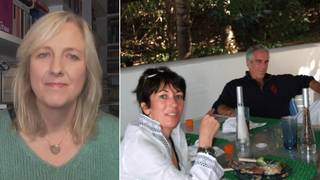
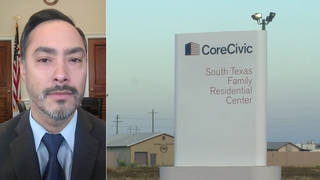
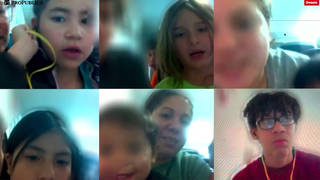
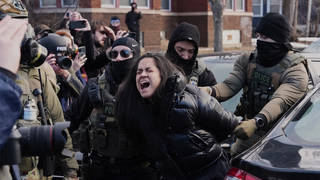






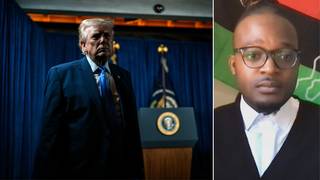
Media Options